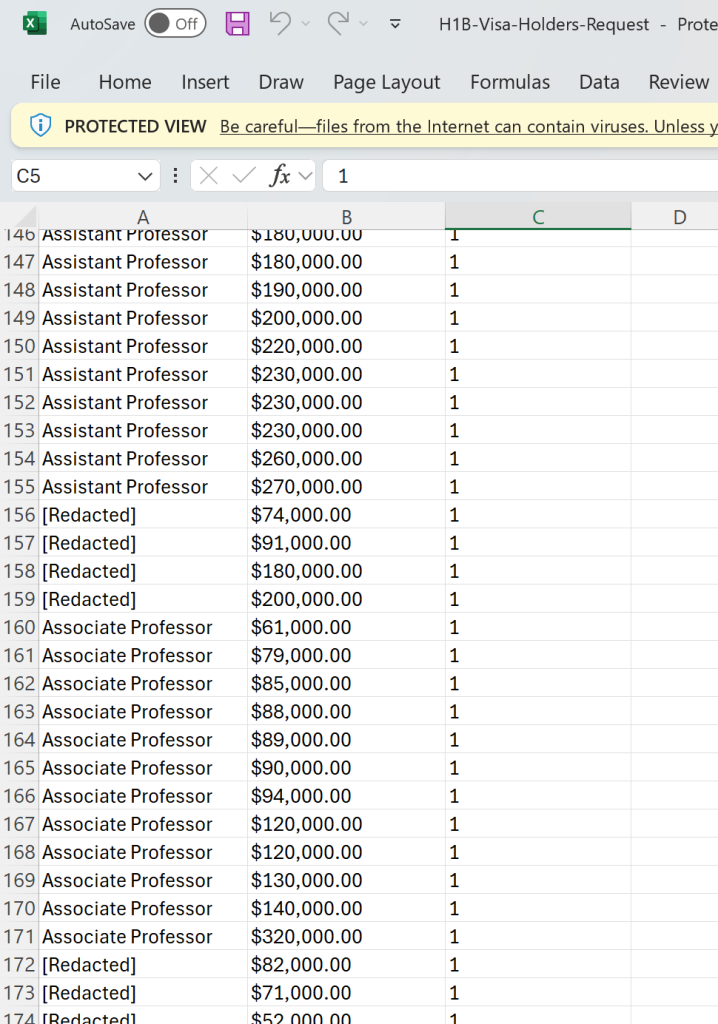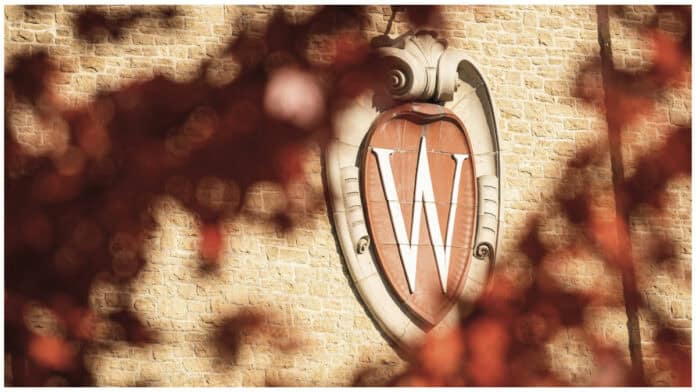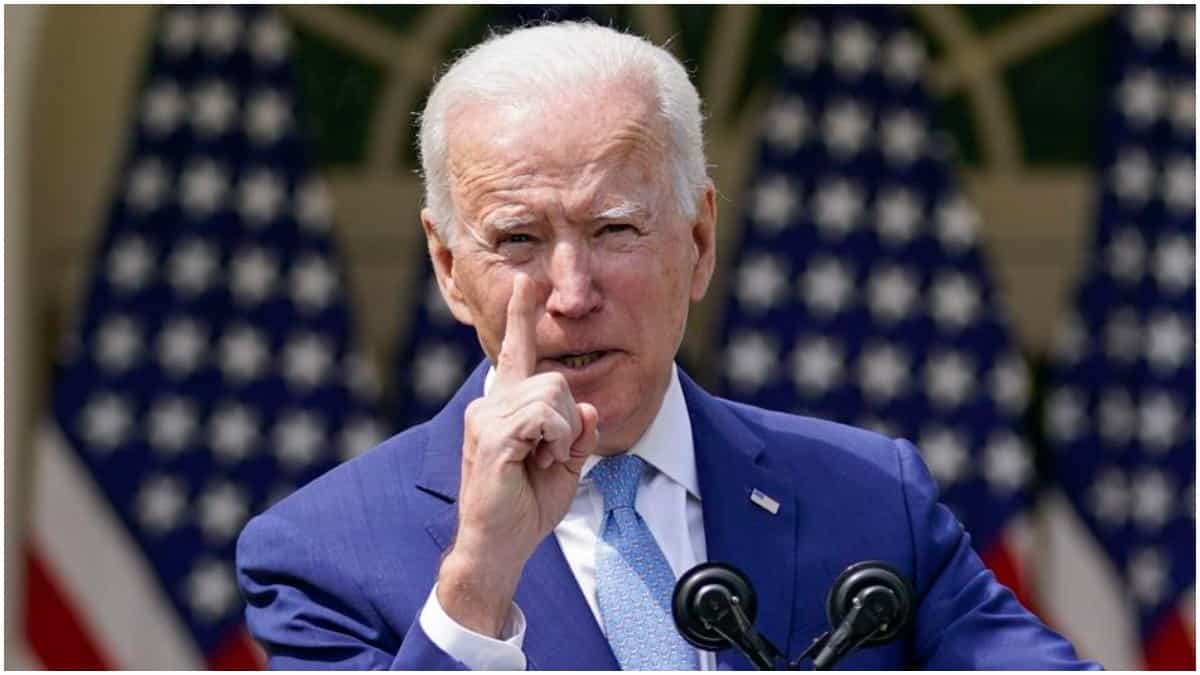With salaries ranging as high as $320,000 a year, are the foreign nationals getting taxpayer-funded jobs at UW instead of qualified U.S. citizens? The Universities of Wisconsin has made it impossible for the public to find out.
The Universities of Wisconsin is paying 495 foreign national H-1B visa holders almost $43 million a year in salaries but is refusing to release their names and even some of their titles, according to data obtained by Wisconsin Right Now through an open records request.
The names of the foreign national workers weren’t released because the Universities of Wisconsin, which receives taxpayer funding, is claiming the privacy rights of the non-citizen staff members outweigh the rights of the public to know which staff members are visa holders.
Those visa holders work as professors, lecturers, researchers, scientists, and in a number of roles that the Universities of Wisconsin has redacted.
Here’s a sample:

What are H1-B visas? “The H-1B program allows companies and other employers in the United States to temporarily employ foreign workers in occupations that require the theoretical and practical application of a body of highly specialized knowledge and a bachelor’s degree or higher in a directly related specific specialty (or its equivalent) as a minimum for entry into the occupation in the United States,” according to the U.S. Citizenship and Immigration Services. The visas are supposed to be for “specialty occupations.”
“H-1B specialty occupations may include fields such as architecture, engineering, mathematics, physical sciences, social sciences, medicine and health, education, business specialties, accounting, law, theology, and the arts,” the government explains. According to the Pew Research Center, there have been bipartisan calls for more oversight of the visa program. In 2024, 400,000 of the visas were approved, double the number in 2020; rejection rates dropped under the administration of former President Joe Biden, Pew reported.
It’s possible that there were no American citizen applicants or people qualified to perform the jobs the Universities of Wisconsin visa holders occupy. It’s also possible that American citizens who could do the jobs are being denied them during the application process. However, it’s impossible to know either way for sure because the Universities of Wisconsin is refusing to release their names. It’s also not possible to review what they’ve done in the U.S., such as the research contributed – or lack thereof. Thus, there is no transparency over those hiring decisions at all, even though they are being made with tax dollars.
Furthermore, the salaries are approximate because the Universities of Wisconsin rounded off exact amounts to further hide the staff members’ (including many professors’) identities from the taxpaying public.
It also comes at a time when the UW’s overall budget request and the percentage of Wisconsin students admitted to UW-Madison are under increasing scrutiny. In other words, Wisconsin taxpayers are paying non-citizen professors to educate, in some cases, non-citizen students from foreign countries. The percentage of Wisconsin high school students enrolling in a UW school has dropped more than 6% since 2007.
Sixty-nine percent of the Universities of Wisconsin students were from Wisconsin in Fall 2024, a percentage that is dragged down by UW-Madison. Only 45% of UW-Madison’s student body came from the state in 2024, even though Wisconsin taxpayers pay the institution the most per enrolled student, Wisconsin Right Now documented via an open records request.
We asked Universities of Wisconsin spokesman Mark Pitsch whether he wanted to make a comment on the necessity of these H-1B hires.
“We are like employers all across the country competing for talent, with a small percentage of our workforce – about 1 percent — employed using these temporary work visas. Critically, these workers help us develop additional talent in Wisconsin at our universities,” he said.
It took the Universities of Wisconsin more than five months to respond to our December 2024 open records request. We asked for a list of all the H-1B visa holders in the University of Wisconsin, at any university, including “name, title, salary.”
Katie Patten, Records Officer and Records Custodian, responded to our request on June 3, 2025, by sending us an Excel sheet. It lists the title (in some cases) and salary, but no names.
“The only system that the Universities of Wisconsin Administration maintains that has immigration status, name, title, and salary is HRS,” she wrote.
“However, the immigration status in HRS is only updated as individuals submit their information into another system. Since this is the record that is responsive to your request, this data is the source of our response,” she added. “The query was done on a single day and the salaries were accurate for the individuals identified on that day.”
She then explained why the names and some titles were treated, and why some salaries were rounded off.
“Pursuant to the Wis. Stat. § 19.35(1)(a) balancing test, the Universities of Wisconsin has determined that the privacy interests of individuals in their visa status outweighs the public’s right to know that status,” Patten wrote. “Therefore, to avoid identifying any individuals and consistent with similar records responses, we redacted all the names of the individuals, any titles when less than 10 H-1B holders had that title, and the salaries were redacted by rounding to two significant figures. The number in the ‘Count (*)’ column indicates the number of individuals with the same unredacted title and salary.”
According to the US government, to qualify, an occupation requires:
- Theoretical and practical application of a body of highly specialized knowledge; and
- Attainment of a bachelor’s or higher degree in a directly related* specific specialty (or its equivalent) as a minimum for entry into the occupation in the United States.
According to the Associated Press, “The H-1B was created as part of the 1990 Immigration Act. It is a type of nonimmigrant visa, meaning it allows for a temporary stay in the U.S. and is not intended for people who want to immigrate permanently.”
The Trump administration “implemented stricter immigration rules, including tightening the definition of ‘specialty occupations’ and limiting third-party placements of H-1B workers,” Pew Research Center reported.
In 2023, 73% of the H-1B visa holders in the U.S. as a whole came from India, Pew reported. China was second with 12%. According to Pew, in 2023, computer-related positions accounted for 64.9% of the visas, with architecture, engineering and surveying second at 9.4%, and 6.2% in education.
AP reported, “The number of new visas issued annually has been capped at 65,000, plus an additional 20,000 for people with a master’s degree or higher. Some employers, such as universities and nonprofits, are exempt from the limits.”
The visas have divided even some Republicans due to their use in the tech industry in particular.
In 2014, The Universities of Wisconsin employed 5,407 faculty, 5,575 instructional academic staff, and 14,906 non-instructional academic staff. There are 43,151 employees overall.

































